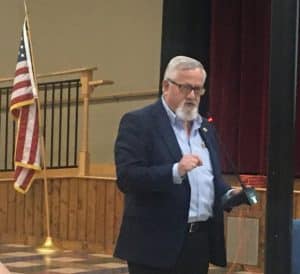News
TDEC Approves NPDES Permit for Jones Alexandria Quarry (View Document Here)
January 31, 2025
By: Dwayne Page
Permit approved!
Jones Alexandria Quarry at Old Highway 53 at Liberty, owned by Jones Brothers Contractors, LLC has cleared a hurdle in its plans to open a new 110. 8-acre limestone quarry and processing facility.
The Tennessee Department of Environment and Conservation’s Mining Section announced Friday, January 31 that it has approved an application by Jones Brothers Contractors for an NPDES permit to discharge treated mine wastewater and storm water into Helton Creek from the proposed quarry which has yet to open.
In making the announcement of the decision, Bryan W. Epperson, Director of the Division of Mineral and Geologic Resources, said “Based on its review of all relevant data, the Division has determined that the National Pollutant Discharge Elimination System (NPDES) permit complies with all applicable statutory and regulatory requirements, is protective of water quality, and can be issued”.
The permit may be appealed to the Board of Water Quality, Oil and Gas pursuant to state law.
It remains to be seen if enforcement of the County Powers Act could still halt the project since the quarry is not yet in operation and apparently does not meet the 5,000-foot distance requirement from residences as called for the in the act. Under the County Powers Act quarries must apply to the county for a permit and those not in operation by October 28, 2024 must give reasons why they should be grandfathered.
The Division issued a draft NPDES permit for Jones Alexandria Quarry on August 22, 2024 and issued a public notice document concerning the draft permit action on August 28, 2024. Due to the amount of public interest in the project, the Division issued a notice of public hearing on November 13, 2024 which requested comments from other regulatory agencies and members of the public.
A hybrid Public Hearing was held at the DeKalb County Complex and via Microsoft Teams video-teleconference on December 17, 2024. Approximately 54 people attended the meeting, and 30 written comments were received during the Public Comment period.
TDEC responded to many of the public comments except for those not directly related to the proposed project. For example, questions were raised about whether the proposed quarry activity would cause pollution of surface water into Helton Creek and impact fish, wildlife, and livestock. In its response, TDEC said the Division has determined that this permit is protective of the designated uses of Helton Creek.
Another concern raised was whether the proposed mining activity would cause pollution of ground water and damage nearby wells, springs, and aquifers. TDEC’s response was that the Division’s Mining Section is not aware of any contamination or damage to water wells due to limestone mining facilities within the state.
A commentator during the public hearing mentioned the location of a possible historic cemetery within the permitted boundary. TDEC’s response was that the NPDES permit is a water discharge authorization and does not authorize impacts to cemeteries.
Others asked what impact the County Powers Act could have on the project. TDEC responded that “The NPDES permit issued by the Division does not have jurisdiction or authority over these issues and does not supersede any local or county rules or regulations, nor can it enforce any local ordinances. Likewise, the Division cannot hold up issuance of an NPDES permit to wait on a determination from local jurisdiction”.
Jail Committee Meets with Consultant to Renew Discussions about Jail Construction (View Video Here)
January 31, 2025
By: Dwayne Page
The DeKalb County Jail Committee met Thursday night at the county complex to renew discussions about building a jail.
It was the committee’s first meeting since the Tennessee Corrections Institute voted in December to keep the existing jail certified under a plan of action to address deficiencies and the second meeting since the November referendum when voters soundly rejected the county’s plans to issue bonds up to $65 million to build a judicial center/190 bed jail complex.
Bob Bass, former Deputy Director of the Tennessee Corrections Institute, who now serves as a county correction partnership consultant, met with the entire 14-member county commission, which comprises the jail committee along with County Mayor Matt Adcock and he did a power point presentation of a proposed master plan for the county to follow. The jail committee listened but took no action Thursday night.
With some preliminary work already having been completed such as an inmate housing study, conducted by Jim Hart Jail Consultant and Field Manager of the County Technical Assistance Service (CTAS), as well as plans and proposals by Bell Construction and Treanor Architects, Bass said the county does not have to start the process over. The county’s next step, he said is to develop a master plan for building a jail and to follow it in steps and phases through to completion. Part of that master plan is site selection for the jail, which should come next.
“The county has done a lot of work,” said Bass who spoke with WJLE after the meeting. “This jail as everyone knows is really in jeopardy of losing its certification. The county is actually under a plan of action. It is what TCI allows and its what the law allows. If you can’t fix some ratios like overcrowding in your jail, you can file a plan of action on how you are going to correct that. The plan they (county) originally filed with us (TCI) was to build a criminal justice center and jail. We are all aware of what happened with the referendum. The citizens spoke. They did not want a courthouse, so they (county) are not going to do that,” explained Bass. “The county is now looking at building a jail because that is what they really need. This is going to be less money because you are not paying for a courthouse”.
“They (county) are not actually starting over. What this was about tonight was how to build a master plan. Lets take the good work that has been done, the feasibility studies, the projections, and start putting things in a format, where the county commissioners can follow and tackle one problem at a time, and then go through phases. Obviously, it is going to start with site selection. They have already selected an architect and construction manager. They have already done a study that was provided by CTAS and myself.
All the data is back. They (county) will get to make decisions on how big it (jail) needs to be built. They will start a concept development and once the concept is done the construction manager will help give them a cost. They will look at the financing to see what they can afford and then they will move forward with it,” said Bass.
Asked what he thought the minimum number of beds should be; Bass suggested a minimum of 150 though he added that decision would be left up to the county.
“Bed space is based on historical data and then its done on population growth and projections. Its also what your incarceration rate is. How many people are you arresting in your county. You look at what your population is today and what your population growth is going to be 20 years out,” said Bass. “We already know that when this process began five years ago you were keeping around 100 inmates and somebody decided to go down in the basement (older jail) and put in a makeshift jail that did not meet our standards. We (TCI) had to show the jail at what it is today at actually 51 beds (down from 102 certifiable beds) They (county) can no longer use that (basement) which immediately put them overcrowded. A 100-bed jail is not sufficient. They (county) have that now. They are farming people out. They (county) have options. You can do 150 beds, shell it out and add 50 more beds later. The actual (future) projection (based on the CTAS study) was around 270 beds,” said Bass.
Asked if the county could just build initially for 125 beds, Bass said “it’s still going to be under a plan of action after you spend all that money (for 125 beds). You’re still going to have those state regulations. Regulatory is not what we do but our standards have to be met in order to be certified. I would say 150 beds is very minimum. I really believe in the science, so they (county) really need to look hard at what that (CTAS) study says and what the (future) bed projection shows but let’s be realistic. We need to build what we can afford and if we can’t afford 272 beds today maybe we can afford that in say five years. So let’s build it where it can be expanded and added onto relatively easy without a lot of extra cost,” said Bass.
Asked if the county could build on the existing site of the jail, Bass said “I have never been a proponent of doing that. It’s a site that is not going to work. You could tear it down and start over and it wouldn’t work. That property will not support that size of a footprint of a jail they need today. It (jail annex) was set up as a dormitory facility with no isolation cells. They (DeKalb Jail) don’t have a cell up there to put just one person in. Refitting it (jail annex) would be so expensive, and you would lose square footage you have now,” Bass explained.
“Your compatibles and non-compatibles (prisoners) you have to keep separate. What we are seeing is a trend toward more violent inmates. Years ago, the standard rule in the industry was about 10% of your jail cells had to be isolation cells. If you had a 110-bed jail, 10 of those cells needed to be solitary, one person cells. That rule is gone now. There is more gang activity even in rural Tennessee and people with anger issues, and more violent crime. Its called classification. When you (inmates) come in you go through a process”.
Although building a dormitory style jail is not preferred, Bass said some county’s still have them.
“That’s part of what we call a housing plan. Tonight, we talked about concept development, and we will do a housing plan. That’s why one jail is different from another. Does the sheriff run a program where he wants to put minimum security in and do work release or they go out? What is he housing and who is he holding. Those studies have been done so when we start doing those housing assignments they will recommend some four person cells, or six person cells, etc. TCI recommends two person cells and to never build a single person cell because the square footage requirements are still the same. You (county) don’t have programs for inmates. Lets have programs for inmates. That is the secret. When they build this new jail lets put them (inmates) out better than they came in,” said Bass.
Although Bass no longer works for TCI as deputy director, his job as consultant is funded by the state, and at no cost to DeKalb County.
“Its an educational based program that TCI offers counties either building jails or expanding. My job is the educational part of it to help with studies or any data needed to be gathered for the decision making. Its at no cost to the county. It is part of what TCI offers,” said Bass.
January 30 Livestock Forage Program Signup Deadline Has Arrived
January 30, 2025
By:
Do you have cattle, sheep, goats, or equine animals? If so, you could be eligible to receive payment from the DeKalb/Cannon County Farm Service Agency. According to Donny Green, County Executive Director, signup for the Livestock Forage Program will end January 30, 2025.
The Livestock Forage Assistance Program (LFP) was approved on September 24, 2024 for DeKalb and Cannon counties due to recent and extreme drought conditions that have affected livestock grazing during the 2024 normal grazing period. LFP provides compensation to eligible livestock producers that have suffered grazing losses for covered livestock on land with permanent vegetative cover or planted specifically for grazing.
Since the LFP signup began in October 2024, just over 400 livestock producers in DeKalb and Cannon counties have been approved and received $887,909.
If you are a livestock producer and have not filed your LFP application since the signup period began in early October, please visit the FSA office in Smithville to file your application before the January 30, 2025 deadline. There are no approval provisions for late filed LFP applications.
For more information, call the office at 615-597-8225, Ext. 2, or come by the Smithville USDA Service Center located at 647 Bright Hill Rd., Smithville, Tennessee. The Farm Service Agency’s office hours are 8:00 a.m. until 4:30 p.m. Monday through Friday.
« First ‹ Previous 1 40 48 49 5051 52 60 150 2567 Next › Last »










